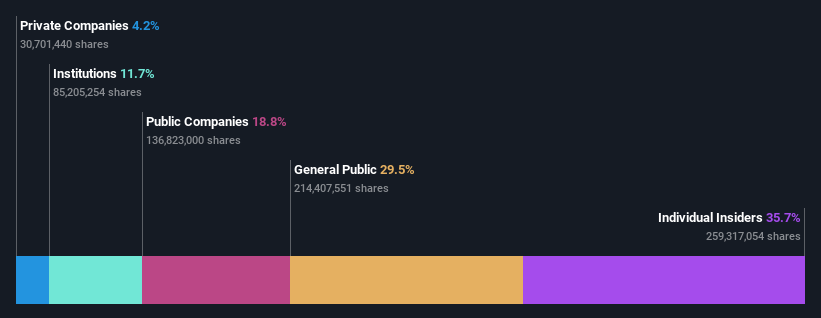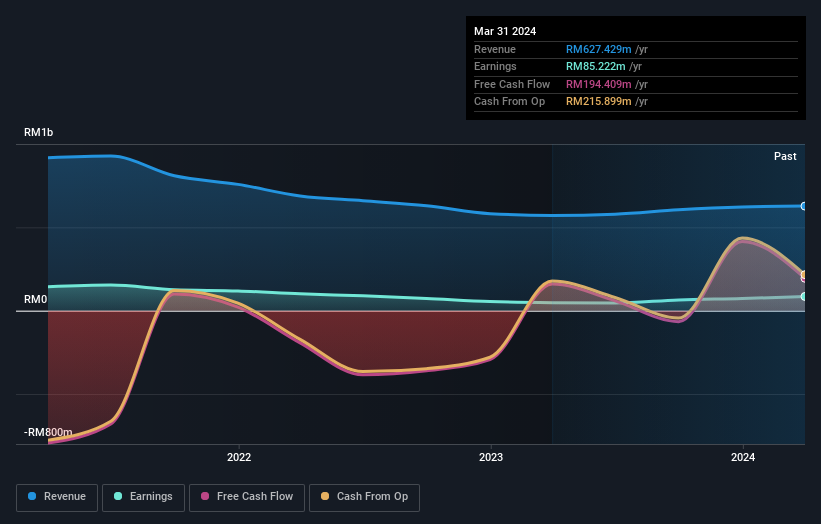With 36% ownership, Kenanga Investment Bank Berhad (KLSE:KENANGA) insiders have a lot riding on the company's future
Key Insights
Kenanga Investment Bank Berhad's significant insider ownership suggests inherent interests in company's expansion
A total of 7 investors have a majority stake in the company with 53% ownership
12% of Kenanga Investment Bank Berhad is held by Institutions
A look at the shareholders of Kenanga Investment Bank Berhad (KLSE:KENANGA) can tell us which group is most powerful. With 36% stake, individual insiders possess the maximum shares in the company. In other words, the group stands to gain the most (or lose the most) from their investment into the company.
So it follows, every decision made by insiders of Kenanga Investment Bank Berhad regarding the company's future would be crucial to them.
Let's take a closer look to see what the different types of shareholders can tell us about Kenanga Investment Bank Berhad.
View our latest analysis for Kenanga Investment Bank Berhad
What Does The Institutional Ownership Tell Us About Kenanga Investment Bank Berhad?
Institutions typically measure themselves against a benchmark when reporting to their own investors, so they often become more enthusiastic about a stock once it's included in a major index. We would expect most companies to have some institutions on the register, especially if they are growing.
Kenanga Investment Bank Berhad already has institutions on the share registry. Indeed, they own a respectable stake in the company. This implies the analysts working for those institutions have looked at the stock and they like it. But just like anyone else, they could be wrong. It is not uncommon to see a big share price drop if two large institutional investors try to sell out of a stock at the same time. So it is worth checking the past earnings trajectory of Kenanga Investment Bank Berhad, (below). Of course, keep in mind that there are other factors to consider, too.
Kenanga Investment Bank Berhad is not owned by hedge funds. The company's largest shareholder is Cahya Mata Sarawak Berhad, with ownership of 19%. For context, the second largest shareholder holds about 14% of the shares outstanding, followed by an ownership of 4.8% by the third-largest shareholder. Noor Binti Ismail, who is the second-largest shareholder, also happens to hold the title of Top Key Executive. In addition, we found that Chay Leong, the CEO has 0.9% of the shares allocated to their name.
We also observed that the top 7 shareholders account for more than half of the share register, with a few smaller shareholders to balance the interests of the larger ones to a certain extent.
Researching institutional ownership is a good way to gauge and filter a stock's expected performance. The same can be achieved by studying analyst sentiments. We're not picking up on any analyst coverage of the stock at the moment, so the company is unlikely to be widely held.
Insider Ownership Of Kenanga Investment Bank Berhad
The definition of company insiders can be subjective and does vary between jurisdictions. Our data reflects individual insiders, capturing board members at the very least. Company management run the business, but the CEO will answer to the board, even if he or she is a member of it.
I generally consider insider ownership to be a good thing. However, on some occasions it makes it more difficult for other shareholders to hold the board accountable for decisions.
Our most recent data indicates that insiders own a reasonable proportion of Kenanga Investment Bank Berhad. Insiders own RM301m worth of shares in the RM843m company. We would say this shows alignment with shareholders, but it is worth noting that the company is still quite small; some insiders may have founded the business. You can click here to see if those insiders have been buying or selling.
General Public Ownership
The general public-- including retail investors -- own 30% stake in the company, and hence can't easily be ignored. While this size of ownership may not be enough to sway a policy decision in their favour, they can still make a collective impact on company policies.
Private Company Ownership
It seems that Private Companies own 4.2%, of the Kenanga Investment Bank Berhad stock. It might be worth looking deeper into this. If related parties, such as insiders, have an interest in one of these private companies, that should be disclosed in the annual report. Private companies may also have a strategic interest in the company.
Public Company Ownership
We can see that public companies hold 19% of the Kenanga Investment Bank Berhad shares on issue. This may be a strategic interest and the two companies may have related business interests. It could be that they have de-merged. This holding is probably worth investigating further.
Next Steps:
I find it very interesting to look at who exactly owns a company. But to truly gain insight, we need to consider other information, too. For instance, we've identified 1 warning sign for Kenanga Investment Bank Berhad that you should be aware of.
Of course this may not be the best stock to buy. Therefore, you may wish to see our free collection of interesting prospects boasting favorable financials.
NB: Figures in this article are calculated using data from the last twelve months, which refer to the 12-month period ending on the last date of the month the financial statement is dated. This may not be consistent with full year annual report figures.
Have feedback on this article? Concerned about the content? Get in touch with us directly. Alternatively, email editorial-team (at) simplywallst.com.
This article by Simply Wall St is general in nature. We provide commentary based on historical data and analyst forecasts only using an unbiased methodology and our articles are not intended to be financial advice. It does not constitute a recommendation to buy or sell any stock, and does not take account of your objectives, or your financial situation. We aim to bring you long-term focused analysis driven by fundamental data. Note that our analysis may not factor in the latest price-sensitive company announcements or qualitative material. Simply Wall St has no position in any stocks mentioned.

 Yahoo Finance
Yahoo Finance 

